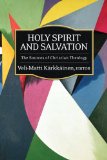Holy Spirit and Salvation: The Sources of Christian Theology. Edited by Veli-Matti Kärkkäinen. Grand Rapids: Louisville, KY: Westminster John Knox Press, 2010. 470 pp. Paper, $49.95.
The fact that there are five pages devoted to “Permissions” (pp. 459-63) tells the reader a lot about this book. If only a small portion of any work is cited, there is no need to obtain permission to include the copyrighted material. However, when larger amounts are used, it is wise to obtain permission (though still not actually necessary under copyright law).
This book is essentially a compilation of quotations. If one were to remove all the quotes, this book might not even cover 100 pages, and it wouldn’t be nearly as valuable. It is the combination of the editor’s comments and the citations themselves that make this work invaluable.
Block quotes in most books run four to eight lines. In this book block quotes often run forty to seventy lines, taking up one or more entire pages.
This is both its strength and its weakness. It is a great strength for the researcher. Here he can find extensive quotes from many major Christian authors. But it is a weakness in that the quotes are given in their raw form. Most citations today pull out the most important information, so that in four to eight lines you know essentially what the person was saying in multiple pages. But here you must read long, often ponderous quotes in order to glean what is being said.
The first nine chapters deal with the history of Pneumatological traditions. The last eight chapters concern contemporary theologies of the Spirit and salvation. It seems a bit odd that the first half of the book concerns ancient theologies of the Spirit, but the later chapters concern contemporary theologies of the Spirit and salvation. If the title of the book is Holy Spirit and Salvation, one would think the first half of the book would cover both those topics as well.
While it takes effort to dig the nuggets out of this work, JOTGES readers should find it well worth the effort. Here are a few of the nuggets I found:
Under “The Spirit in ‘Evangelical’ Theologies” (pp. 350-63), the editor cites this amazing statement from Donald Bloesch, “Salvation is not only a gift to be received but also a task to be performed. It not only a privilege to be conferred but also a race to be won, a crown to be gained (1 Cor 9:24; Heb 12:1; 2 Tim 4:8). Lutherans are often better than Calvinists in affirming the paradox of divine agency in the procuring of salvation and human responsibility for the loss of salvation…” (p. 357).
Under “Spiritual Experience,” the editor makes this inciteful statement, “Several leading Latin American liberation theologians speak for many pneumatologists when they call for the primacy of spiritual experience over doctrine and theology” (p. 444). Of course, that same thinking pervades the teaching of spiritual formation in American seminaries, including many conservative ones.
This statement is remarkable too: “The Roman Catholic Church more than any other church throughout the centuries has attempted to define its doctrine and spirituality by means of official documents” (p. 292). Kärkkäinen then gives quotes from papal encyclicals and from the Second Vatican Council, making it clear that what he means is that Roman Catholic doctrine and spirituality is sourced in its tradition, not in the Scriptures directly. Kärkkäinen expresses no difficulties with any of the views about which he writes. As far as the reader can tell, the editor has no axe to grind whatsoever. He is simply content to report what others believe. In a way this makes the book that much more refreshing since the reader is left to decide what is right and what is not. There is no guidance from the editor in this regard.
There is also a citation from the famed Puritan author John Bunyon (Pilgrim’s Progress) in which Bunyon writes of an extended time of agony over doubts about his eternal destiny which gave way to what appears to be certainty that he would be in the Kingdom. Note these words, “Suddenly this sentence fell upon my soul, ‘Thy righteousness is in heaven’…I also saw, moreover, that it was not good frame of mind that made my righteousness better, nor yet my bad frame that made my righteousness worse; for my righteousness was Jesus Christ Himself, the same yesterday, and to-day, and for ever (Heb. 13:8)…Now did my chains fall off my legs indeed, I was loosed…I lived for some time, very sweetly at peace with God through Christ; Oh, methought, Christ! Christ! There was nothing but Christ that was before my eye” (pp. 205-206).
This book is filled both with insightful comments by the author as well as excellent quotes from primary sources. While the price of this book is steep, it is one that systematic and historical theologians would greatly prize, and one which many pastors would find worth the cost and effort to read. A pastor should be able to find scores of quotes to use in sermons in this book. I recommend it.
Robert N. Wilkin
Editor
Journal of the Grace Evangelical Society
Denton, Texas


